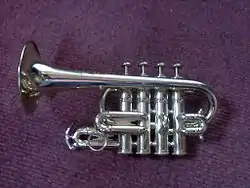Piccolo trumpet
The smallest of the trumpet family is the piccolo trumpet, pitched one octave higher than the standard B♭ trumpet. Most piccolo trumpets are built to play in either B♭ or A, using a separate leadpipe for each key. The tubing in the B♭ piccolo trumpet is one-half the length of that in a standard B♭ trumpet. Piccolo trumpets in G, F, and even high C are also manufactured, but are rarer.

The piccolo trumpet should not be confused with the pocket trumpet, which plays in the same pitch as the regular B♭ trumpet.[1]
Types and details
The piccolo trumpet in B♭ is a transposing instrument, which sounds a minor seventh higher than written. It is, however, rarely written for specifically; it is often just used at the player's discretion to cover high material as appropriate.
The soprano trumpet in D, also known as the Bach trumpet, was invented in about 1890 by the Belgian instrument maker Victor Mahillon to play the high trumpet parts in music by Bach and Handel.
The modern piccolo trumpet enables players to play the difficult trumpet parts of Baroque music, such as Bach's second Brandenburg Concerto and Mass in B minor. Adolf Scherbaum was the first to specialize in the piccolo trumpet repertoire and to discover new baroque works, doing original transcriptions. Maurice André further developed the modern piccolo repertoire, playing the instrument for 50 years.
The sound production technique is basically the same as that used on the larger B♭ trumpet. Air pressure and tonguing are different, and players use a shallower mouthpiece for the piccolo trumpet. Almost all piccolo trumpets have four valves instead of three — the fourth valve usually lowers the pitch by a fourth. This extends the low range and provides alternate fingerings and improved intonation for some notes.
Use in "Penny Lane" and elsewhere
The piccolo trumpet solo in the Beatles' "Penny Lane", which introduced the instrument to pop music, was played by David Mason. Paul McCartney was dissatisfied with the initial attempts at the song's instrumental fill (one of which is released on Anthology 2), and was inspired to use the instrument after hearing Mason's performance in a BBC radio broadcast of the second Brandenburg Concerto and asking George Martin what the "tremendously high" trumpet was.[2] Eventually Mason recorded the solo using a piccolo trumpet in A.[3] The piccolo trumpet was also used to quote Bach's Invention no. 8 in F major (BWV 779) during the fade-out of "All You Need Is Love".
Use of the instrument is now commonplace in many musical genres. Maurice André, Otto Sauter, Guy Touvron, Reinhold Friedrich, Adolf Scherbaum, Ludwig Güttler, Wynton Marsalis, and Håkan Hardenberger are some well-known piccolo trumpet players.
See also
- Brass instrument
- Piccolo (flute)
References
External links
- Maurice Andre website See section : Piccolo tpt
- Piccolo trumpet models
- Piccolo trumpet manufacturers
- History of the piccolo trumpet

